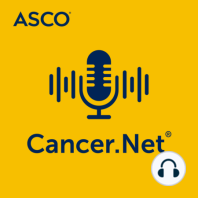12 min listen

Research Highlights from the 2018 San Antonio Breast Cancer Symposium, with Norah Lynn Henry, MD, PhD, FASCO
Research Highlights from the 2018 San Antonio Breast Cancer Symposium, with Norah Lynn Henry, MD, PhD, FASCO
ratings:
Length:
5 minutes
Released:
Jan 29, 2019
Format:
Podcast episode
Description
ASCO: You’re listening to a podcast from Cancer.Net. This cancer information website is produced by the American Society of Clinical Oncology, known as ASCO, the world’s leading professional organization for doctors who care for people with cancer. The purpose of this podcast is to educate and to inform. This is not a substitute for professional medical care and is not intended for use in the diagnosis or treatment of individual conditions. Guests on this podcast express their own opinions, experience, and conclusions. The mention of any product, service, organization, activity, or therapy should not be construed as an ASCO endorsement. Cancer research discussed in this podcast is ongoing, so the data described here may change as research progresses. In this podcast, Cancer.Net Associate Editor Dr. Norah Lynn Henry discusses new research that was presented at the 2018 San Antonio Breast Cancer Symposium, held December fourth through eight in San Antonio, Texas. Dr. Henry is an Associate Professor in the University of Utah's Division of Oncology in the Department of Medicine, and Leader of the Women’s Cancers Disease Center at the Huntsman Cancer Institute. ASCO would like to thank Dr. Henry for discussing this topic. Dr. Henry: Good morning. I am Dr. Lynn Henry, a breast medical oncologist at Huntsman Cancer Institute in Salt Lake City. I would like to share with you one of the exciting breast cancer advances from the 2018 San Antonio Breast Cancer Symposium that was recently held in San Antonio, Texas. First, just a reminder that breast cancer is divided into 3 main categories determined by the presence or absence of receptors on the cancer cell. These categories include hormone receptor positive, HER2-positive, and the so-called triple-negative breast cancer, when all 3 of those main receptors are negative. The study I'm highlighting, which is called KATHERINE, focused specifically on patients with HER2-positive breast cancer. The most commonly used antibody medication used to treat HER2-positive cancer is called trastuzumab, which is also called Herceptin. In the KATHERINE trial, the researchers were testing a different but related drug called trastuzumab emtanzine, which is also called Kadcyla. This new drug is the trastuzumab antibody linked directly to a type of chemotherapy drug. This allows the chemotherapy to be directed specifically to the HER2-positive cancer cells, so it generally causes fewer side effects than typical chemotherapy. Since the generic names of the medications are quite similar, I'm going to refer to them as Herceptin and Kadcyla in the rest of this podcast. Many patients with HER2-positive breast cancer have treatment with chemotherapy and anti-HER2 drugs, like Herceptin, before they undergo surgery in order to try to shrink the cancer and ideally make it all go away. About half of the patients treated this way have no cancer found in their breast or lymph node when they have surgery, but the other half still have cancer remaining. Regardless of what is found at surgery, all patients are usually recommended to have additional treatment with Herceptin after surgery, so they receive a total of 1 year of Herceptin treatment. The KATHERINE trial is important because it asks the question, "Do women who still have cancer left in the breast when they have surgery after chemotherapy and anti-HER2 therapy—do they get more benefit from treatment with Kadcyla, which is Herceptin with the chemotherapy drug, for about 10 months after surgery compared to the standard treatment Herceptin?" In this trial of almost 1500 patients, those who were treated with Kadcyla were much less likely to have their cancer return compared to those treated with Herceptin. The new treatment decreased the risk of cancer returning by about half. Patients with both hormone receptor-positive and hormone receptor-negative breast cancer appeared to benefit from this treatment, however, the downside was that patients treated with Kadcyla ha
Released:
Jan 29, 2019
Format:
Podcast episode
Titles in the series (100)
Understanding ASCO’s Recommendations for Managing Febrile Neutropenia, with Christopher Flowers, MD: In this podcast, we discuss ASCO’s recommendations for managing a symptom of cancer and cancer treatment called febrile neutropenia. This podcast is led by Dr. Christopher Flowers, who is an associate professor at the Winship Cancer Institute in the... by Cancer.Net Podcast